|
|
|
Sort Order |
|
|
|
Items / Page
|
|
|
|
|
|
|
| Srl | Item |
| 1 |
ID:
144376
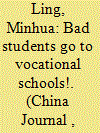

|
|
|
|
|
| Summary/Abstract |
China’s second-generation rural-to-urban migrant youth, who grew up in their parents’ adopted cities, are still denied urban residential status and suffer from the institutional closure of higher education opportunities. This article explores in ethnographic detail the experiences and subjectivities of migrant youth in Shanghai who since 2008 have been channeled to secondary vocational schools. It highlights the direct involvement of the local state in reproducing a social hierarchy in which migrant youth provide cheap labor for manufacturing and low-skilled service industries. It reveals how contention over the limited choice of majors and career trajectories persists between state intention, market demand and individual aspirations. The time and space provided by vocational schooling enable migrant students to gain urban habitus and form networks across boundaries. Vocational schools have thus become a unique site for studying education and class reproduction in a late-socialist context.
|
|
|
|
|
|
|
|
|
|
|
|
|
|
|
|
| 2 |
ID:
180641
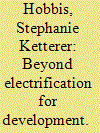

|
|
|
|
|
| Summary/Abstract |
Based on an in-depth examination of the acquisition, use, maintenance and deterioration of solar home systems in a village in Malaita, Solomon Islands, this article challenges the analytical focus of current debates on electrification in Pacific Island countries – why Pacific Island countries have not yet sufficiently electrified to achieve their development goals. Alternatively it examines what is, how, in this case, rural Solomon Islanders have integrated already available electricity into their daily lives. This perspectival shift highlights how rural Solomon Islanders have developed an energy identity that corresponds to their needs, interests and values, rather than those of national and international actors. It re-emphasises the struggles of national and international electrification initiatives in rural environments, linking them to a broader distrust in the motivations of external actors. At the same time, it reveals how, throughout their life cycle, rural solar home systems have become integrated into processes of social reproduction rather than development aspirations. Contrary to dominant debates, rural solar home systems matter most in the opportunities that they provide for reciprocal exchange than for what the electricity enables them to do.
|
|
|
|
|
|
|
|
|
|
|
|
|
|
|
|
| 3 |
ID:
160882
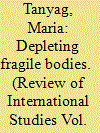

|
|
|
|
|
| Summary/Abstract |
In a crisis-prone world, the number of internally displaced persons (IDPs) uprooted by both armed conflicts and environmental disasters has drastically increased and displacement risks have intensified. Despite the growing attention within global security and development agendas to sexual and reproductive health and rights (SRHR), there remain striking gaps in addressing SRHR in crisis situations, particularly among IDP women and girls. This article examines the continuum between social reproduction in times of crisis and the material and ideological conditions that restrict women’s bodily autonomy in everyday life. Using the case of the Philippines where millions of people are routinely affected by conflict and disaster-induced displacements, it argues that the failure to recognise the centrality of women’s health and bodily autonomy not only hinders the sustainable provision of care and domestic labour during and after crisis, but also fundamentally constrains how security is enacted within these spaces. Thus, the article highlights an urgent need to rethink the gendered political economy of crisis responses as a building block for stemming gendered violence and depletion of social reproductive labour at the household, state, and global levels.
|
|
|
|
|
|
|
|
|
|
|
|
|
|
|
|
| 4 |
ID:
184071


|
|
|
|
|
| Summary/Abstract |
Drawing on immersive ethnographic fieldwork at three events in Scotland, all grounded in ecological sensibilities and focusing respectively on alternative medicine, music and reviving seasonal celebrations, this article illuminates aspects of what we call ‘festive commoning’. We ask: how, and to what extent, were commons ‘against and beyond’ capital produced in these gatherings? We re-read a history of resistance to festive autonomy in this light, as a continuing struggle against capitalist enclosures of time, space, knowledge, history and being in the world. We argue that alternative grassroots gatherings can produce a ‘festive commons’ that resists such enclosures, including breaking down divisions between self and other, human and non-human beings. Such processes generate collective joy, and enliven the radical imagination. Experiencing festive commons is not only an aspect of the pleasure valued in some radical traditions, but also makes another world possible, even if only a temporary one.
|
|
|
|
|
|
|
|
|
|
|
|
|
|
|
|
| 5 |
ID:
164975
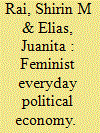

|
|
|
|
|
| Summary/Abstract |
It goes without saying that feminist International Political Economy (IPE) is concerned in one way or another with the everyday – conceptualised as both a site of political struggle and a site within which social relations are (re)produced and governed. Given the longstanding grounding of feminist research in everyday gendered experiences, many would ask: Why do we need an explicit feminist theorisation of the everyday? After all, notions of everyday life and everyday political struggle infuse feminist analysis. This article seeks to interrogate the concept of the everyday – questioning prevalent understandings of the everyday and asking whether there is analytical and conceptual utility to be gained in articulating a specifically feminist understanding of it. We argue that a feminist political economy of the everyday can be developed in ways that push theorisations of social reproduction in new directions. We suggest that one way to do this is through the recognition that social reproduction is the everyday alongside a three-part theorisation of space, time, and violence (STV). It is an approach that we feel can play an important role in keeping IPE honest – that is, one that recognises how important gendered structures of everyday power and agency are to the conduct of everyday life within global capitalism.
|
|
|
|
|
|
|
|
|
|
|
|
|
|
|
|
| 6 |
ID:
159154
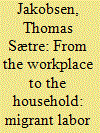

|
|
|
|
|
| Summary/Abstract |
Working class studies on China commonly use the lens of proletarianization to understand class formation among peasant workers who move into cities to work in China’s manufacturing sector. However, in the decade since the 2008 global financial crisis, proletarianization is an increasingly fading possibility for the Chinese peasantry, as urban labor markets remain saturated. Instead of peasants being transformed into proletariats, new patterns of class formation have emerged, where the interconnections between agrarian and urban remain central to peasant-workers living without dispossession. The Marxist feminist centering of practices and social arrangements of social reproduction, i.e. workforce maintenance, provides a welcome point of departure for redrawing some of our class maps in the shadow of the 2008 global economic crisis. This contribution draws on multi-sited ethnographic research among migrant workers toiling in the petty-commodity workplaces of Kunming, and in the adjacent countryside of Yunnan Province, to document the fluid class formation among families living on labor’s frontier. Through examining different experiences of workforce reproduction for families and migrant laborers as they move in and out of the workforce and household self-provisioning for subsistence, alternative imaginations for the possibilities of subsistence autonomy emerge.
|
|
|
|
|
|
|
|
|
|
|
|
|
|
|
|
| 7 |
ID:
173997
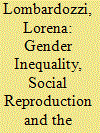

|
|
|
|
|
| Summary/Abstract |
Despite extensive attention being paid to the effects of the Universal Basic Income (UBI) on society at large, there has been little analysis on the relationship between gender inequality and UBI. The purpose of this article is first to reflect on the feminist arguments in favour of UBI and then to examine some of these points by also considering other available policies. By looking into the role of women’s work in both productive and reproductive activities, it is argued that UBI should not be disregarded as a social policy. However, its transformative capacity to empower women and to strengthen their role in society should not be overestimated. In order to address this gap, policy makers should address misconceptions around gender norms and acknowledge the multiple forms of women’s work across the social relations of production and reproduction.
|
|
|
|
|
|
|
|
|
|
|
|
|
|
|
|
| 8 |
ID:
108705
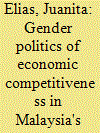

|
|
|
|
|
| Publication |
2011.
|
| Summary/Abstract |
Many academic commentators have pointed to how the widening and deepening of a neoliberal reform agenda in Southeast Asia has brought about the end of developmental forms of state governance and the emergence of less directly market interventionist states pursuing economic 'competitiveness'. In this paper, I note how notions of competitiveness are increasingly fused with ideas regarding the contribution of gender equity and women's empowerment to national economic success. However, drawing upon a case study of Malaysia, this paper highlights how government policies stressing both the marketisation of social reproduction and the need to expand women's productive roles are constantly brought into tension with embedded social structures. Such an emphasis is essential to any understanding of the role of the Malaysian state in economic development - a role that has been fundamentally shaped by a localised politics of ethnicity. The paper draws upon examples from government policy-making that conceptualise women as key workers in the emerging knowledge-driven economy and as microentrepreneurs driving pro-poor economic growth and illustrates how such policies are brought into tension with traditionalist discourses concerning the appropriate role of women in society.
|
|
|
|
|
|
|
|
|
|
|
|
|
|
|
|
| 9 |
ID:
099055


|
|
|
|
|
| Publication |
2010.
|
| Summary/Abstract |
This article challenges popular claims about the capacity for microfinance to reduce poverty and empower women in the global South. Instead, I posit microfinance as a contradictory development tool, one that creates possibilities for both the contestation and continuation of unequal social relations at multiple scales. The article is divided into two major sections. I begin by examining the assumptions embedded in mainstream financial mappings of global space since the 1980s. In particular, I show how they privilege the transnational mobility of corporate capital and elide the everyday, place-based work of social reproduction. I examine the expansion and commercialisation of microfinance in this context, as an alternative mechanism for enabling poor households to continue meeting their everyday needs by taking on more debt. In the second section, I draw on fieldwork in Andhra Pradesh, India, to show how these interlocking macro/micro financial flows interact with regional social histories to shape and differentiate people's mobility 'on the ground' according gender, caste, and class. I conclude by suggesting how a critical geopolitics framework can help formulate new questions about microfinance as a development strategy.
|
|
|
|
|
|
|
|
|
|
|
|
|
|
|
|
| 10 |
ID:
169025
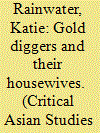

|
|
|
|
|
| Summary/Abstract |
From 1975 to 1990 several hundred thousand Thais became guest workers in the Middle East. Focusing on texts from the period including migrant guidebooks, lyrics, and state publications, this contribution analyzes the gendered political economy of the migration of Thai men to Saudi Arabia, a phenomenon referred to domestically as “gold digging.” While the Thai state imposed restrictions on the export of female laborers, Thai women were nevertheless believed to have an important role in transnational migration as left-behind housewives who offered their husbands long-distance emotional support and regular assurances of their fidelity. This research engages Marxist feminist theory to demonstrate how left-behind wives contributed to and were impacted by their husbands' participation in guest worker programs. It demonstrates that guest worker programs outsource not only intergenerational reproduction to labor-sending communities but also affective dimensions of labor-power renewal. Moreover, the confluence of guest worker programs with patriarchal norms in labor-sending communities may mean that left-behind wives – like guest workers themselves – experience restrictions on their sexuality and freedoms of movement and expression.
|
|
|
|
|
|
|
|
|
|
|
|
|
|
|
|
| 11 |
ID:
152799


|
|
|
|
|
| Summary/Abstract |
The grand narrative of piracy has been instrumental in shaping how piracy off the coast of Somalia is understood and responded to. Self-proclaimed pirates, suspected pirates, and convicted piracy prisoners continue to tell the story of taking up arms against foreign illegal fishers to protect their personal livelihoods as well as Somalia’s natural resources. Although the grand narrative remains the most popular piracy narrative, this paper introduces and examines two newly emergent narratives of Somali piracy – the Somali women’s narrative and the piracy prisoner self-narrative. I explore how these narratives reveal a central paradox surrounding piracy and social reproduction in Somalia that, until now, has been absent from discussions about piracy narratives and the issue of Somali piracy. Whereas the grand narrative of piracy fails to address gender demands and local political economic realities in Somalia, the new narratives present piracy as a gendered experienced that is situated within the broader, evolving context of courtship and marriage in Somalia. I argue the new narratives can help push beyond over-simplistic understandings of piracy off the coast of Somalia as a ‘man’s crime’ that should be addressed by men.
|
|
|
|
|
|
|
|
|
|
|
|
|
|
|
|
| 12 |
ID:
148290


|
|
|
|
|
| Summary/Abstract |
This paper takes as its starting point the multidirectionality and multi-sitedness of change triggered by migration, especially in relation to gender and migrant precarity. More specifically, it interrogates four strands of the gendered migration debate related to marriage migration: various forms of precarity faced by migrant women and their implications in socio-economic and legal terms; changes to family patterns and social reproduction connected to marriage migration; social policies in origin and destination countries and their relevance to women’s unpaid care work duties; and the productive and reproductive functions involved in the creation of a precarity that leads to, and results, from marriage migration. It points to remaining gaps in knowledge and offers ideas for future lines of inquiry into marriage migration in general and in the context of Asia specifically.
|
|
|
|
|
|
|
|
|
|
|
|
|
|
|
|
| 13 |
ID:
126107
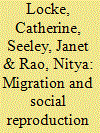

|
|
|
|
|
| Publication |
2013.
|
| Summary/Abstract |
This review paper focuses on low-income migrants in (or from) developing countries and their social reproduction, and asks what this means for their social protection. We focus on the recognition that migration involves (re)negotiations of social reproduction by migrants and their families. These renegotiations are heavily inflected with gendered power relations in ways that are specific to individual and family life course. As such, migration involves taking on new risks and dynamic vulnerabilities in sustaining everyday and intergenerational social reproduction. These are sharpened by the increasing feminisation of migration flows and obstructed by wider changes in social provisioning and exclusionary citizenship regimes. The resulting social protection challenges unfold over lifetimes, and are especially marked at critical periods of transition. Life-course thinking has the potential to theoretically integrate emerging insights from rich empirical studies; doing this supports the rationale for revaluing the importance of social reproduction within debates about migration and social protection.
|
|
|
|
|
|
|
|
|
|
|
|
|
|
|
|
| 14 |
ID:
126106
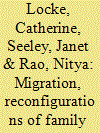

|
|
|
|
|
| Publication |
2013.
|
| Summary/Abstract |
This introduction reviews the contributions this collection of articles makes to understanding migration, social reproduction and social protection. Migration necessarily involves reconfigurations of family relations and these entail changes in the patterning of social (in)security. Our expansive interpretation of the concepts of social reproduction and social protection situate the reorganisation of gendered family lives as integral to the migration-development nexus. Life-course thinking informs analysis of how migrants 'do family' and what this means for gender, identity and (in)security. The collection explores how 'care deficits' are managed, both discursively through the negotiation of gendered ideologies about gender identity and the family, and through the everyday practice of social reproduction. The resulting reorganisation of social security involves taking on new risks and vulnerabilities for migrants and their families. For both internal and international migrants the challenges involved in securing social reproduction are powerfully shaped by welfare and migratory regimes and raise important questions about the relationship between social protection and broader social policy and citizenship issues.
|
|
|
|
|
|
|
|
|
|
|
|
|
|
|
|
| 15 |
ID:
175054
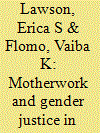

|
|
|
|
|
| Summary/Abstract |
At the end of their country’s 14-year civil war (1989–2003), Liberian women established Peace Huts to provide conflict resolution and mediation services to disputing community members. Peace Huts are modeled on the centuries-old Palava Hut system used to address disputes, but the latter are largely run by men. This article examines how Liberian women have adopted the Palava Hut system to suit their needs in the interest of advancing transitional justice. We document and analyse what women do at Peace Hut sites and how their pursuit of peace and gender justice is related to motherwork, understood in feminist scholarship as the exercise of political agency through maternal activism. Based on a year-long study with women who provide social labour in Peace Huts, this article seeks to provide insight into how women participate in post-conflict initiatives amid infrastructural challenges, structural violence and tensions between the best legal approaches to gender justice and human rights.
|
|
|
|
|
|
|
|
|
|
|
|
|
|
|
|
| 16 |
ID:
126240
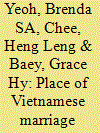

|
|
|
|
|
| Publication |
2013.
|
| Summary/Abstract |
While the literature on 'global care chains' has focused on the international transfer of paid reproductive labour in the form of domestic service and care work, a parallel trend takes the form of women marriage migrants, who perform unpaid labour to maintain households and reproduce the next generation. Drawing on our work with commercially matched Vietnamese marriage migrants in Singapore, we analyse the existing immigration-citizenship regime to examine how these marriage migrants are positioned within the family and nation-state as dependants of Singaporean men with no rights to work, residency or citizenship of their own. Incipient discussions on marriage migrants in civil society discourse have tended to follow a 'social problems' template, requiring legislative support and service provisioning to assist vulnerable women. We argue for the need to adopt an expansive approach to social protection issues, depending not on any one single source-the state, civil society and the family-but on government action to ensure that these complement one another and strengthen safety nets for the marriage migrant.
|
|
|
|
|
|
|
|
|
|
|
|
|
|
|
|
| 17 |
ID:
190347
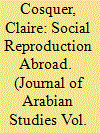

|
|
|
|
|
| Summary/Abstract |
This article looks at how the highly internationalized context of Abu Dhabi and the benefits of migration intersect for French migrants. It analyzes the tensions surrounding a specific form of the repatriation of the benefits of migration: how these are passed on to children. While French migrants generally receive higher salaries and consolidate dominant class positions in Abu Dhabi, they also have to deal with the remoteness of national structures of social reproduction. Drawing on an ethnographic study of French migrants in Abu Dhabi conducted from October 2015 to May 2016 (participant observation and interviews, n = 70), this article argues that migrants adjust their educational strategies in order to build up a cosmopolitan repertoire and ensure different paths of social reproduction. The article introduces three forms of educational strategies and associated cosmopolitan repertoires and shows how these relate to the parents’ social positions.
|
|
|
|
|
|
|
|
|
|
|
|
|
|
|
|
|
|
|
|
|